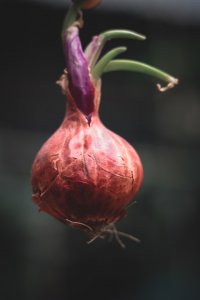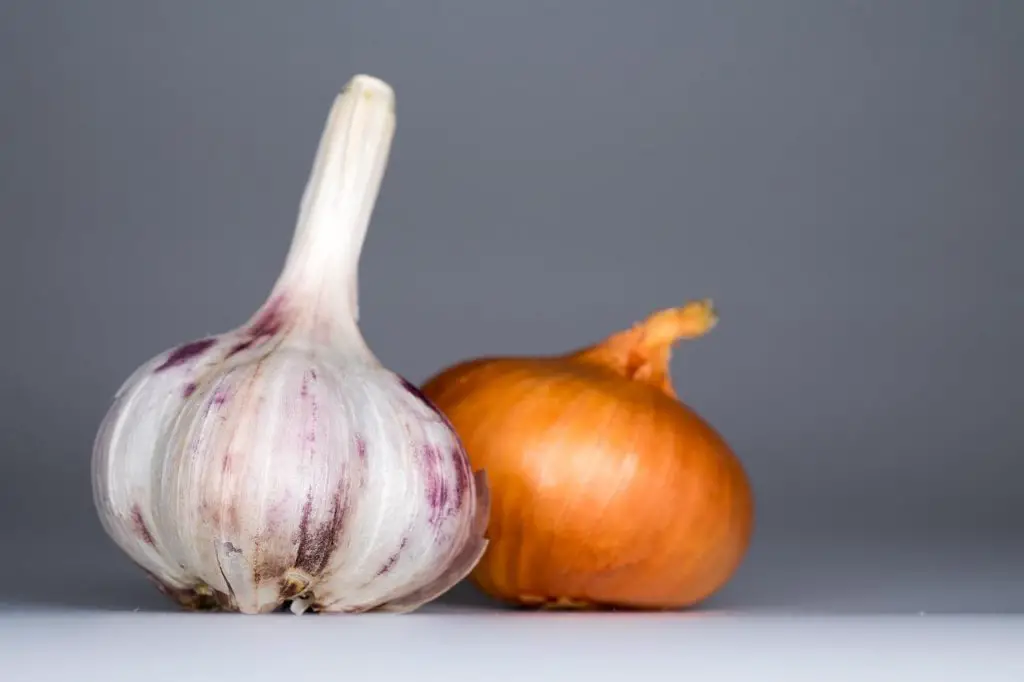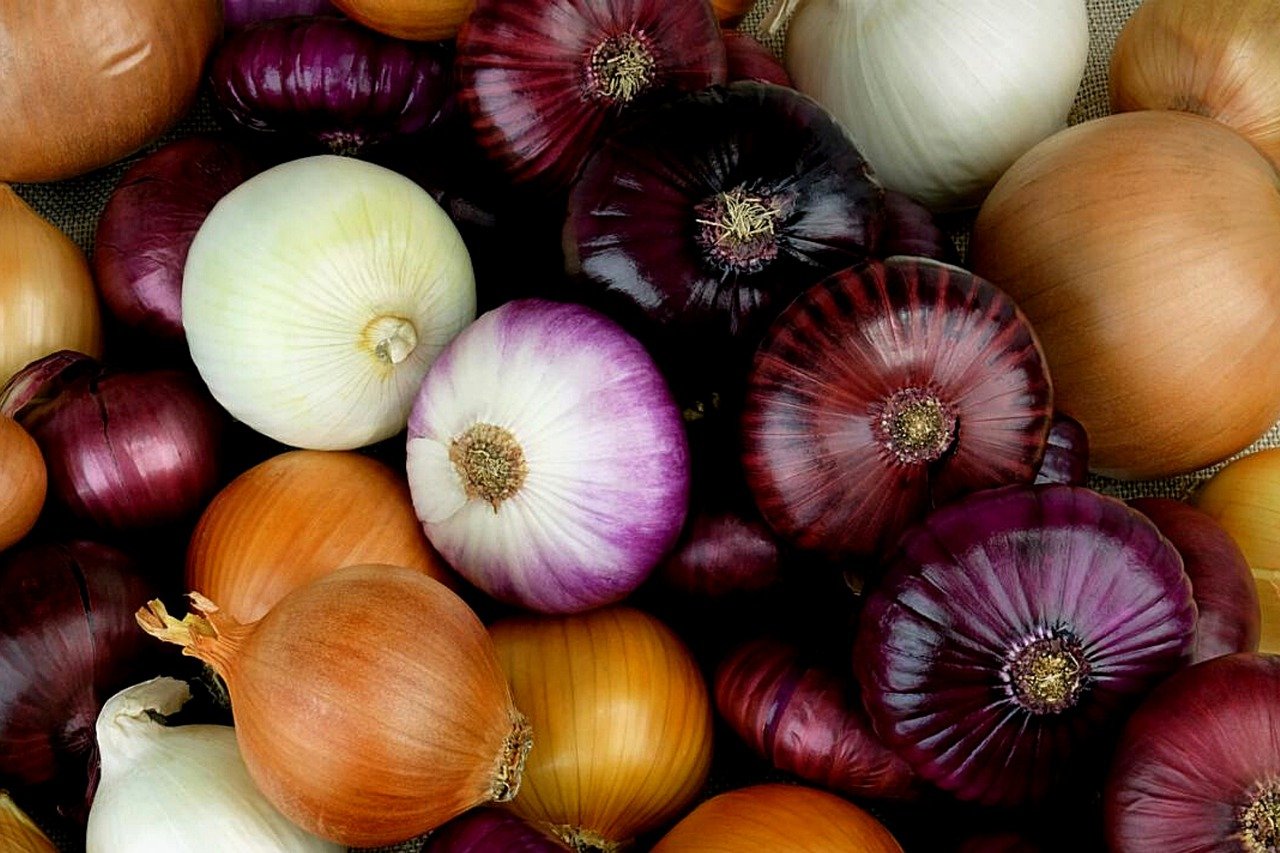Yes, you can compost onions. Just like other food waste, onions are biodegradable. Onions and other vegetables from the allium family (shallots, garlic, and leeks) are some of the easiest items to compost.
The Food and Agriculture Organization of the United Nations (FAO) also recommends onions as one of the edible food waste that is compostable. You only need to ensure that they are not treated with chemicals.
Table of Contents
Is It OK To Put Onions in Compost?
Yes, it is OK to add onions to compost since they are biodegradable. Their metabolites will break down naturally into simpler substances and return to the soil.
In its lifetime, an onion plant absorbs significant amounts of nutrients from the soil and stores them in its bulbs. When the bulbs die and decompose, they release these nutrients into the soil, making them available to growing plants.
So chop that onion into smaller pieces and add it to your compost pile or bin.
You should also note that onions have low pH. Therefore, if you want to lower the pH of your compost bin, it is OK to add them.
Adding onions that are naturally acidic to an alkaline compost helps balance it.
The downsides?
Onion skins contain sulfur compounds, which can sometimes cause problems for backyard composters because they attract flies and insects.
Also, people may not like the hydrogen sulfide smell that comes out during decomposition. It smells like a rotten egg and may kill some plants like lettuce and many herbs when in high concentration.
The Benefits Of Composting Onions
There are numerous benefits to composting onion scraps.
These include:
- Helps control pests and diseases.
- Helps to balance the soil PH.
- Onions hold moisture, reducing the need to water the garden and drain excess water.
- Onions save you money using the home compost instead of the expensive fertilizers.
- Adds nutrients to the soil enhancing the soil quality.
- Improves the soil structure and compaction, enabling the plant’s roots to penetrate the soil and access nutrients easily.
Should You Compost Cooked or Raw Onions?
The cooking changes the structure of the onion. It also changes how quickly the cells break down in your compost pile. This is important because most composters prefer a more accelerated decomposition process.
Even with the quick decomposition process, composting cooked onions isn’t ideal. This is because they have more cellulose than raw ones, which means they stick together more when decomposing.
Also, check for fat residue from cooking oils or juices from the meat. If there are still traces of fat on the rings of your onion pieces, composting will be extremely slow.
This is because fats attract animals like slugs and flies that love to snack on organic matter —and since they don’t digest plant material the way bacteria do, they won’t help break down the onions further.
If you insist on using cooked onions, ensure that you remove all the fats and food residues they may have.
Composting Whole Onions

Whether you can compost whole onions depends entirely on your level of expertise in composting.
If you are not a composting expert, it is best to avoid composting whole onions since they may regrow into new shoots.
In addition, the process requires you to break down the cell walls of onions which are thick and difficult to deal with.
The onion roots can grow up to 10 feet long, so even a small piece can take root and sprout a new shoot!
Onions are among the most easily grown edibles from seed. If you’re determined to compost your onion, make sure you cut off the root end and remove any green parts before throwing it in the compost.
Composting Onion Peelings
You may think that onion peeling is not useful at all. However, onion peels are compostable! They are not just onion wastes that should be thrown in the garbage bin.
They are a great source of soil microbes and nutrients, improving the soil’s quality and enhancing high yields in your garden. They may be tough; wet them first to allow for an easy breakdown.
Conversely, earthworms do not like odorous food craps such as onions; you should not use it in a vermicomposting bin.
How to Compost Onions in 7 Easy Steps
The key to having good compost is balancing the carbon and nitrogen-rich organic materials in your compost bin.
Since we’ve learned that it is possible to compost onions, it is good to know a composting method that you can do at home.
Here are a few easy steps on how to compost onions at home.
Step 1: Chop into small pieces
Large chunks of onion may take longer to decompose because onions have layers. It is also not advisable to use whole onions because they may regrow instead of decomposing.
Step 2: Include newspaper & cardboard
Be sure to mix with newspaper and cardboard to help reduce the odor of the onions.
An optional step is to include eggshells, chalk, and grass clippings to help reduce the onions’ acidity.
Step 3: Burry 10+ inches below the surface.
By burying the onions, they will decompose faster, allowing the nutrients to enter the soil. This can also help reduce the odor.
Step 4: Continue with your normal weekly process.
Add fresh soil and stir each week to ensure the onions are fully mixed into the compost.
What About Garlic?
Garlic is among the most versatile ingredients in the kitchen. From sauces to soups and rubs, it’s a flavor booster that helps make any dish more delicious. It’s also highly sustainable—you can add it to your compost pile or bin and know it will break down just fine.

Garlic is also full of nutrients for plants and soil. It’s rich in nitrogen, phosphorus, and potassium (NPK). When these elements break down in the soil, they release nutrients for plants to absorb.
The National Center for Appropriate Technology and the U.S. Composting Council recommends that adding garlic to your compost heap helps to control pests in your garden by repelling them from eating your other produce.
Garlic also has a high carbon-to-nitrogen ratio, making it an ideal addition to a compost pile when trying to maintain that balance.
The best part about adding garlic to your compost pile is that you don’t need to peel or chop it before tossing it in. Just throw away any spoiled bits, and you’re good to go!
When you’re ready to make some compost, spread garlic cloves around the base of your pile and cover them with leaves or other materials to help keep moisture in the pile.
Once you’ve started your pile, add other materials enriched with more garlic cloves.

